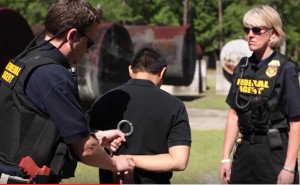The Trump Administration’s first annual budget proposal to Congress (for fiscal year 2018) seeks to reduce the EPA’s budget by a third, as promised. Some of the details are yet to emerge, but there is already a heated debate about major cuts in the agency’s Office of Enforcement & Compliance Assurance (OECA). Analysts say the President’s budget probably means cutting EPA enforcement dollars by half, and enforcement staff by at least 20 percent.
 Reductions outlined in the budget document include 60 percent of OECA’s civil enforcement funding, 55 percent of its criminal enforcement funding, and 13 percent of its compliance monitoring funds. It also proposes eliminating about 1300 jobs in those enforcement programs, along with a number of cuts in other EPA programs.
Reductions outlined in the budget document include 60 percent of OECA’s civil enforcement funding, 55 percent of its criminal enforcement funding, and 13 percent of its compliance monitoring funds. It also proposes eliminating about 1300 jobs in those enforcement programs, along with a number of cuts in other EPA programs.
Spending reductions of tens of millions of dollars may not seem significant in a federal budget measured in trillions. But if approved by Congress, this budget could represent a tectonic shift of strategy in the way our country deals with environmental law. Scaling back regulatory over-reach, and stopping heavy-handed enforcement by militarized EPA police, is entirely consistent with the President’s campaign promises, and with EPA Administrator Scott Pruitt’s assurances to the Senate during his confirmation. Thus, it should come as no surprise that the budget reflects those promises. Yet Obama-era appointees (including some who once ran those same enforcement programs) are irate, sounding the alarm that the sky is about to fall and there will be no more environmental enforcement.
In fact, the new strategy is based on enforcement at the State level, for which there is ample precedent, especially in the area of environmental law. Much of the nation’s environmental enforcement has been delegated to States for years, including jurisdiction over clean air and water rules. My home State of Colorado is among many States whose environmental departments are in charge of such enforcement, and has shown that federal standards can certainly be enforced by States. President Trump and Administrator Pruitt simply propose to restrict EPA’s enforcement activities to those areas not delegated to States, thus eliminating expensive duplication and unnecessary overkill.
The outraged Obama appointees (quoted last week in several reports) claim the EPA acts as a “backstop,” with States doing most inspections for civil violations, and EPA “able to step in and fill any gaps.” They warn that state-only jurisdiction would all but end enforcement of most EPA programs, and leave many violations unpunished.
That use of the word “unpunished” is a perfect illustration of the need for precisely this shift in strategy. The goal of our whole national environmental consciousness is, or should be, to foster a clean and healthy environment – not to punish people. But a law enforcement mindset has so permeated the federal system that officials simply cannot imagine any other solution. The EPA, its former administrators, and its allies in the environmental industry, hope to convince Congress to reinstate the funding for all these programs. They should not hold their breath, though, because there is simply no large constituency for that viewpoint. Almost nobody is clamoring for federal control of anything these days, least of all EPA control.
On the contrary, many Americans are worried about the rapid expansion of police powers in agencies like the EPA. A report last December revealed that there are now more federal officers with arrest and firearm authority (200,000 in 67 different agencies) than there are U.S. Marines. Those agencies (80 percent of which are not law enforcement agencies) spent nearly $1.5 billion on guns, ammunition, and military-style equipment between 2006 and 2014. EPA alone spent over $3 million on guns, ammo, drones, helicopters, camouflage, body armor, and night-vision goggles. Its criminal enforcement program alone cost over $700 million.This isn’t about whether environmental laws should be enforced. It’s about the proper role of government, at the most efficient level. Colorado has done an outstanding job, meeting or exceeding many federal standards, achieving cleaner air and water than we have seen in many years. There is always more to be done, but nobody – certainly not EPA – cares more about it than the people who live there.
In giving EPA police powers to enforce environmental laws (30 years ago), Congress never envisioned midnight raids with SWAT teams and attack dogs, confiscating private property, hauling people off to jail for accidental spills, or other such horrors that are much too common.
Many of us learned as children that when we stuck our hand where it didn’t belong, it sometimes got slapped. Even the heavy hand of government is not immune from that lesson.
A version of this column originally appeared in the Grand Junction Daily Sentinel May 5, 2017.





Be careful Greg, you may be putting forth to much logic for those standing left and their media surrogates.
An appropriate bookend to the downsizing of the EPA was just announced….Trump takes the U.S. out of the Paris Climate Accord, even though this Accord was not ratified by congress, thus not binding on the U.S.
And once again a campaign promise fulfilled.
Best,
Glenn
Comments on this entry are closed.